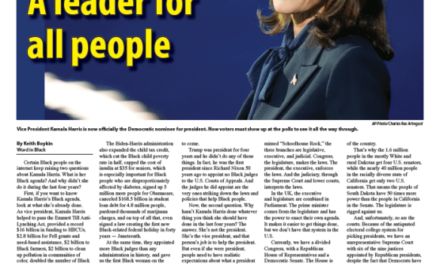By Helen Bezuneh,
Special to the AFRO
Marsha Coleman-Adebayo, president of the Bethesda African Cemetery Coalition (BACC), was overjoyed to hear that Circuit Court Judge Karla Smith had ruled in favor of the coalition’s fight to prevent what they call the “desecration” of a historically Black cemetery in Bethesda in 2021. She couldn’t have predicted that, two years later, she would be tirelessly organizing a solemn emergency conference to discuss the Maryland Appellate Court’s recent reversal of Judge Smith’s decision.
On June 28, the Appellate Court reversed Judge Smith’s preliminary and permanent injunctions preventing a developer’s sale of a property that lies atop Bethesda’s Moses Macedonia African Cemetery, which historically served a once-thriving Black community on River Road. Members of the Macedonia Baptist Church and descendants of those buried at the cemetery founded BACC which has worked to protect this site against Montgomery County’s Housing Opportunities Commission (HOC) since 2019.
“The [Appellate] Court was confronted with two scenarios,” said Coleman-Adebayo. “One was to look at this case through the lens of the community that was targeted with genocide and its descendants, or to look at this case through the lens of the developers. And the court decided to look at this case strictly through the lens of developers,” she continued. “What the court determined is that it is now open-season on Black burial grounds.”
Invoking legislation that, they say, is supposed to protect the sanctity of burial grounds, BACC remains committed to their movement, now planning to appeal to Maryland’s Supreme Court.
Asserting that the cemetery still holds hundreds of deceased African Americans today, the BACC initially sued the HOC to stop the sale of the Westwood Tower Apartments to Charger Ventures LLC, an investment management company. In 2021, Judge Smith issued the injunctions on the grounds that the HOC must seek court approval before selling the property as required by state law.
The Circuit and Appellate Court judges had differing interpretations of a particular statute that concerns the sale of burial grounds. Refuting Judge Smith’s reading, the Appellate Court concluded that the statute does not require HOC to obtain court approval before selling the property. Instead, they say that the statute only necessitates court approval if developers seek to make the sale free of descendants’ future claims to the property.
“The decision of the Appellate Court of Maryland confirms that HOC has properly observed the laws which protect burial grounds in Maryland,” said Chelsea Andrews, executive director of the HOC, in a written statement. “HOC’s involvement with the Westwood Towers property has been in service of our mission to provide affordable housing to low and moderate income residents of Montgomery County and that continues to be our priority moving forward. HOC acknowledges the significance of the African American history affiliated with this site and will continue to respect and honor this legacy in the community.”
Steve Lieberman, a lawyer representing the BACC, finds that the Appellate Court’s decision takes an incorrect, “technocratic approach” to the statute. In his interpretation, the statute makes clear that court approval is required before the sale of a cemetery. In the process, he says, courts must notify descendants and those who have cultural affiliation with the cemetery, such as the church, of the developer’s request.
The court’s decision, Lieberman says, ignores centuries of Maryland court decisions that have treated burial grounds as sacred grounds. He also finds that the decision creates a “two-tier system,” a system wherein property owners can mistreat less-resourced communities that aren’t as populated as they used to be, and are therefore less capable of defending themselves.
“If you have a burial ground that’s in a wealthy area where people there have resources and legal knowledge, the property owner will know that they absolutely have to go through this procedure [of court approval],” he said. “But if you’re dealing with a ground that’s abandoned or relatives don’t have the resources, then the property owner can roll the dice.”
River Road’s Black population wasn’t always so scant. In the 1700s, enslaved people worked at several tobacco plantations that existed along the road. After the Civil War, emancipated African Americans bought property along the road and eventually formed a tight-knit community.
In the 1950s and 60s, gentrification and rising patterns of racist violence pushed the community out of the area, Gibbs says.
“All of this was done in cooperation with Montgomery County, who was more than willing to [allow for] the literal extinction of Black people, or at least the reduction of Black presence,” Gibbs remarked, “in order to attract White suburbanites and people coming in from parts of the District of Columbia.”
Today, the church and the cemetery are the only remnants of that once-flourishing community.
Now, Coleman-Adebayo says, the BACC is focused on a central demand: the immediate return of over 200+ remains taken from a site adjoining the cemetery by a contractor.
In 2020, the contractor hired a group of archaeologists to excavate the site. The group discovered bone fragments in the soil, but ultimately determined them to be animal remains. The coalition, however, alleges that the bones have yet to be formally tested. Given the area’s history, they find it likely that the fragments are human remains.
Through the Maryland Public Information Act, the coalition discovered that the bones were then moved to a warehouse in Virginia, says Coleman-Adebayo.
Moving forward, Coleman-Adebayo finds it crucial to not only demand the return of the bones, but to also organize the descendant community and develop a plan of action.
In addition to holding an emergency conference with descendant communities and social movements from across the U.S., the BACC has recently attended two HOC meetings to express their demands. In doing so, they sought to develop coalitions with other “victims of HOC” and “educate that community about HOC’s commitment to destroy and erase African history.”
“We consider the struggle that we’re engaged in a foundational struggle as opposed to a symptomatic struggle,” Coleman-Adebayo said. “We see police brutality, the murders of young Black boys, a lack of equality around voting rights, as symptoms of White supremacy. But we’re…fighting at the level of structural White supremacy.”
The post Efforts to protect Black cemetery in Bethesda stalled by appellate court appeared first on AFRO American Newspapers .











